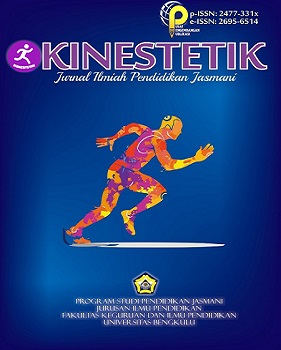Main Article Content
Abstract
Women who have careers in sports coaching still tend to be low, especially in masculine sports such as sport climbing. There were several studies that examined the careers of athletes and coaches, but there was no research that examined the careers of coaches in sport climbing from a gender perspective. The study investigated the career position of Indonesian sport climbing coaches viewed from a gender perspective. This research applied a qualitative research approach with a case study method. The respondent in this study was one female coach who had been a national athlete and had international achievements and had sent her athletes to international competitions. The sample was taken using snowball sampling so that there were more respondents, namely male coaches, head coaches, male athletes and women athletes. Women trained by female coach thus forming a triangulation of respondents. Observation, open interviews, and documentation were used as data collecting tools. The results of this research show that the career of female coaches kept improving, starting from being a sport climbing coach for children at the Pasar festival, then becoming a coach for Denjaka and Kopassus, becoming a DKI junior coach, and now coaching the Papua PON team. Apart from that, the respondent has also been a sport climbing athlete who excelled both nationally and internationally. Due to his achievements as an athlete and trainer, the respondent now works as a functional civil servant at the Ministry of Youth and Sports whose main task is to train sport climbing athletes. To further demonstrate his existence, the respondent has begun to expand into the world of service industry. By establishing the largest indoor sport climbing training center in Indonesia called Indoclimb. The respondent serves as head coach and one of the owners of Indo Climb.
Keywords
Article Details
Copyright (c) 2023 Mela Aryani , Berliana Rahely , Komarudin Komarudin, Dede Rohmat Nurjaya

This work is licensed under a Creative Commons Attribution-ShareAlike 4.0 International License.
Authors who publish in this journal agree with the following terms:- Authors retain copyright and grant the journal right of first publication with the work simultaneously licensed under a Creative Commons Attribution-ShareAlike 4.0 (CC BY-SA) that allows others to share the work with an acknowledgement of the work's authorship and initial publication in this journal.
- Authors are able to enter into separate, additional contractual arrangements for the non-exclusive distribution of the journal's published version of the work (e.g., post it to an institutional repository or publish it in a book), with an acknowledgement of its initial publication in this journal.
- Authors are permitted and encouraged to post their work online (e.g., in institutional repositories or on their website) prior to and during the submission process, as it can lead to productive exchanges, as well as earlier and greater citation of published work (See The Effect of Open Access).
- This work is licensed under a Creative Commons Attribution-ShareAlike 4.0 International License.
References
- Khadijah, M. A., & Amelia, N. (2020). Perkembangan fisik motorik anak usia dini: teori dan praktik. Prenada media.
- Komaini, A., Kiram, Y., & Daniati, N. (2021). Improving Children’s Motor Skills with Experiential Learning-Based Games. 35(Icssht 2019), 178–181. https://doi.org/10.2991/ahsr.k.210130.036
- Latifa, U. (2017). Perkembangan pada Anak Sekolah Dasar: Masalah dan Perkembangannya. Academica: Journal of Multidisciplinary Studies, 1(2), 185–196. https://ejournal.uinsaid.ac.id/index.php/academica/article/download/1052/297
- Sugiyono. (2015). Metode Penelitian dan Pengembangan. Alfabeta.
- Zeng, N., Ayyub, M., Sun, H., Wen, X., Xiang, P., & Gao, Z. (2017). Effects of physical activity on motor skills and cognitive development in early childhood: A systematic review. BioMed Research International, 2017. https://doi.org/10.1155/2017/2760716
References
Khadijah, M. A., & Amelia, N. (2020). Perkembangan fisik motorik anak usia dini: teori dan praktik. Prenada media.
Komaini, A., Kiram, Y., & Daniati, N. (2021). Improving Children’s Motor Skills with Experiential Learning-Based Games. 35(Icssht 2019), 178–181. https://doi.org/10.2991/ahsr.k.210130.036
Latifa, U. (2017). Perkembangan pada Anak Sekolah Dasar: Masalah dan Perkembangannya. Academica: Journal of Multidisciplinary Studies, 1(2), 185–196. https://ejournal.uinsaid.ac.id/index.php/academica/article/download/1052/297
Sugiyono. (2015). Metode Penelitian dan Pengembangan. Alfabeta.
Zeng, N., Ayyub, M., Sun, H., Wen, X., Xiang, P., & Gao, Z. (2017). Effects of physical activity on motor skills and cognitive development in early childhood: A systematic review. BioMed Research International, 2017. https://doi.org/10.1155/2017/2760716
